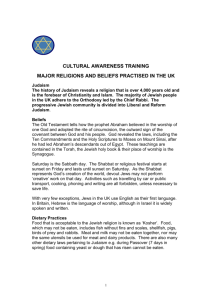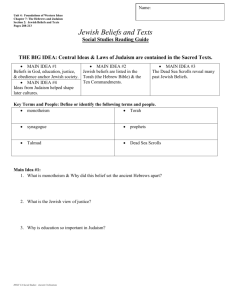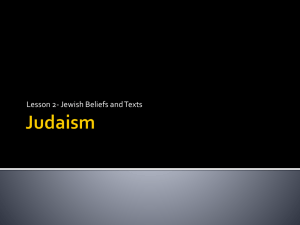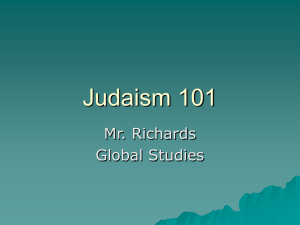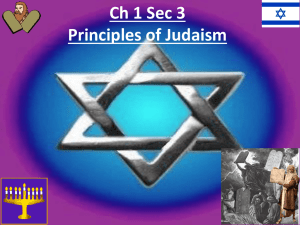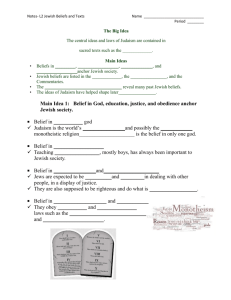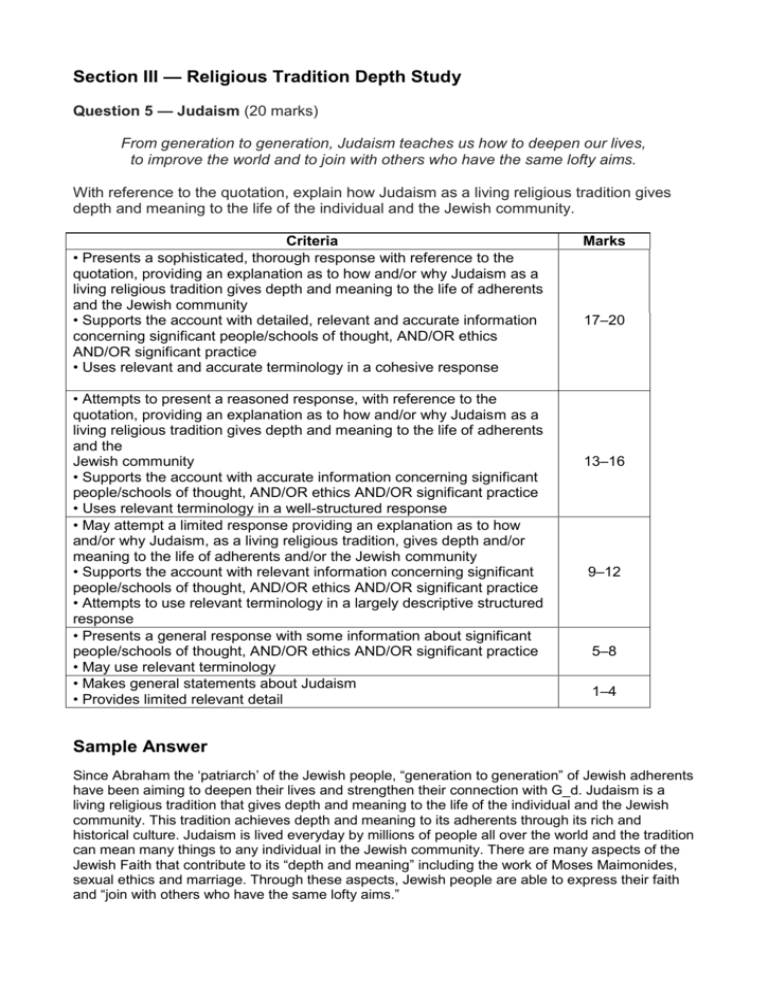
Section III — Religious Tradition Depth Study
Question 5 — Judaism (20 marks)
From generation to generation, Judaism teaches us how to deepen our lives,
to improve the world and to join with others who have the same lofty aims.
With reference to the quotation, explain how Judaism as a living religious tradition gives
depth and meaning to the life of the individual and the Jewish community.
Criteria
• Presents a sophisticated, thorough response with reference to the
quotation, providing an explanation as to how and/or why Judaism as a
living religious tradition gives depth and meaning to the life of adherents
and the Jewish community
• Supports the account with detailed, relevant and accurate information
concerning significant people/schools of thought, AND/OR ethics
AND/OR significant practice
• Uses relevant and accurate terminology in a cohesive response
• Attempts to present a reasoned response, with reference to the
quotation, providing an explanation as to how and/or why Judaism as a
living religious tradition gives depth and meaning to the life of adherents
and the
Jewish community
• Supports the account with accurate information concerning significant
people/schools of thought, AND/OR ethics AND/OR significant practice
• Uses relevant terminology in a well-structured response
• May attempt a limited response providing an explanation as to how
and/or why Judaism, as a living religious tradition, gives depth and/or
meaning to the life of adherents and/or the Jewish community
• Supports the account with relevant information concerning significant
people/schools of thought, AND/OR ethics AND/OR significant practice
• Attempts to use relevant terminology in a largely descriptive structured
response
• Presents a general response with some information about significant
people/schools of thought, AND/OR ethics AND/OR significant practice
• May use relevant terminology
• Makes general statements about Judaism
• Provides limited relevant detail
Marks
17–20
13–16
9–12
5–8
1–4
Sample Answer
Since Abraham the ‘patriarch’ of the Jewish people, “generation to generation” of Jewish adherents
have been aiming to deepen their lives and strengthen their connection with G_d. Judaism is a
living religious tradition that gives depth and meaning to the life of the individual and the Jewish
community. This tradition achieves depth and meaning to its adherents through its rich and
historical culture. Judaism is lived everyday by millions of people all over the world and the tradition
can mean many things to any individual in the Jewish community. There are many aspects of the
Jewish Faith that contribute to its “depth and meaning” including the work of Moses Maimonides,
sexual ethics and marriage. Through these aspects, Jewish people are able to express their faith
and “join with others who have the same lofty aims.”
Moses ben Maimon (RamBam) was one of the greatest Jewish thinkers of all times influencing not
only his own era, but also the lives of Jewish adherents today. In 1158 he began writing his
Commentary on the Mishnah. He wrote it in Arabic, the everyday language of the Jews under
Muslim rule, so that the Mishnah would be understandable to Jews. Twenty years later, in 1178,
after ten years of work, he completed the fourteen volumes of the Mishneh Torah, which
condensed the Talmud and all the writings of the Jewish scholars into a simple code that the
layperson could understand without lengthy study of the Talmud. Maimonides well understood the
need to keep the Jewish Tradition alive because the Mishneh Torah was written in Hebrew, the
universal language of Jews of every nationality. Maimonides continued to revise the work
throughout the rest of his life. Of central importance to Judaism is Maimonides’ Thirteen Articles of
Faith which he explained in his Commentary on the Mishnah. These have been a guide to the
principal beliefs of Judaism for centuries, and have been incorporated into most Jewish prayer
books. Today Maimonides’ work is understood as defining the essence of what each and every
Jew should be doing when faced with the demands of both their everyday work and Torah study—
that is, making sure that the ‘lofty aims’ of Torah study and living have a place in their busy lives.
Jewish sexual ethics are concerned with commitment, responsibility and living deeply with one
another. Strict codes of behaviour, known as niddah (purity laws) have been developed. In
Judaism the sexual act is sacred and must be performed with the right partner in the right context
and at the right time. Marriage is called kiddushin (holiness) in Hebrew, and as such is considered
as a metaphor for the love that G_d has for his people (Book of Hosea). G_d has given sexual
pleasure to humanity for a delight, to make a bond between a man and a woman so they can build
a happy marriage. Premarital sex is forbidden because ‘oneness and completeness’ of the couple
can never be achieved outside of marriage. Premarital sex inhibits the possibility of deepening
lives; sex is not just an act of momentary pleasure; it is an act of immense significance that
requires commitment and responsibility from those involved. Celibacy is not understood to be a
valued way of life either, because it does not contribute to the procreation of the generations
(Genesis 2:18). Homosexuality, although understood today as a matter of personal choice is
discouraged because it also does not contribute to the procreation of the generations. As well as
this it undermines the role of the family and its importance within the tradition of Judaism. Other
sexual practices that impede the improvement of the world are also addressed in the Hebrew
Scriptures. Incest relationships are outlawed in Leviticus 18:6 and bestiality in Leviticus 18:23. The
act of sex should be an experience of joy, and sex without regard for the partner’s feelings is
considered evil!
The practice of marriage also gives depth and meaning to not only the lives of the individuals
concerned, but the whole Jewish community. Marriage is deemed the natural and desirable state
of every adult. It is a mitzvah: “Therefore shall a man leave his father and his mother and shall
cleave unto his wife and they shall be one flesh (Gen 2:24)”. Marriage partnerships are decided by
G_d. According to the Torah, a man must provide his wife with clothes, food and sexual relations
(Ex 21:20). The marriage must be consummated, “multiply and fill the earth” (Gen 1:28). The
ceremony is significant for the individuals involved as they prepare for a life together entirely
different to what they have known. The individuals are participating in a longstanding tradition
considered one of the most holy institutions of their faith. The experience involves a number of
rituals pertaining to particular aspects of their beliefs, therefore they are reaffirming their faith. A
sense of fulfilment comes from participating in the ritual and experiencing the matrimony G_d
commands. Families are extended by the practice. This therefore becomes significant for the
community as they are drawn together in celebration. Ideas and beliefs are reinforced as the
community witnesses the numerous rituals that form the basis of this practice. They act as
witnesses to this holy institution as a longstanding tradition is continued. From this marriage it is
assumed a family will stem, therefore expanding the community and welcoming new members.
Another Jewish tradition which “improves the world” is Tikkun Olam (repairing the world), a concept
which fulfils an individual’s own spiritual needs as well as helping the greater good of the
community as G_d commands. For Jews Tikkun Olam can mean they are responsible for creating
a model society among themselves but also are responsible for the larger community. The practice
of this idea is a “lofty aim” which deepens the life of the individual through doing good acts asked
for by G_d and attempting to repair the world through small deeds of kindness, this therefore gives
a sense of purpose on Earth as well as personal fulfillment in doing a moral act. Humanity's
responsibility to change, improve, and fix its earthly surroundings is powerful. It implies that each
person has a hand in working towards the betterment of his or her own existence as well as the
lives of future generations. Tikkun Olam forces people to take ownership of their world. It is them,
not G-d, who will bring the world back to its original state of holiness. Tikkun Olam gives a more
spiritual meaning to life; it is important for Jews to participate in repairing the world by participating
in tzedakah (justice and righteousness) and g'milut hasadim (acts of loving kindness). Without their
stake in the improvement of their environment, injustice and evil will continue to exist.
Hence, Judaism gives depth and meaning to the lives of Jewish individuals as well as the whole
community through the teaching of Maimonides, sexual ethics, the significant practice of marriage
and the tradition of Tikkun Olam which gives depth to their lives and helps them to improve the
world and join together as a community.


